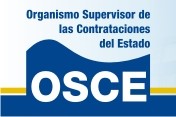Quick facts
 |
Country: Peru |
 |
Year of assessment: 2019 |
 |
Procurement value: Approx. €82.608.000.000 (2019) |
 |
Principal organisation:
|
 |
Main partners:
|
Background
- The State Procurement Supervisory Body (OSCE) is a specialized technical body that is part of the National Supply System and is attached to the Economy and Finance sector. One of its tasks is to implement activities and mechanisms for the development of capacities and competencies in the management of government contracting.
- Peru has 12,804 public procurement officials certified by levels.
- In 2018, Peru signed a USD 18 million debt contract with the Inter-American Development Bank (IDB) to carry out the “Capacity Improvement for the Generation of Knowledge and Continuous Improvement in Public Procurement Management” project. One of the project’s components is "Human Resources Capacity".
- To develop this component, a diagnosis was needed to allow the design and implementation of a new improved training model for public procurement officials. OSCE decided to apply the MAPS Professionalisation Supplementary Module, because it identifies the strengths and weaknesses of a procurement system, specifically with regard to the professionalisation of the procurement function. For this purpose, it had the support of the IDB.
Process
 |
|
Key results and impacts
The key findings of the assessment were:
LEGAL FRAMEWORK
- Regulations and policies should recognise the importance of public procurement professionalisation.
INSTITUTIONAL FRAMEWORK
- Professionalisation plans should be comprehensive, that is, they should include, in addition to the diagnosis of training needs, detailed planning and monitoring.
- Professionalisation plans should be articulated with strategic procurement plans.
- A procurement performance measurement system should be implemented.
MARKET PRACTICES
- A public procurement career path should be designed and implemented for officials working in public procurement.
- Building partnerships to offer more training programmes on public procurement and bring them to a wider audience.
ACCOUNTABILITY, INTEGRITY AND TRANSPARENCY
- Integrity and accountability should be part of professionalisation plans. The offer of training programmes must incorporate the principles and ethical guidelines applied to public procurement.
The MAPS assessment identified the need to generate training programmes that enhance the knowledge and skills of public buyers. These programmes should be centred on practical application to ensure relevance for participants. They should also include mechanisms that support public servants in their own self-development, with tasks or evaluations that help to demonstrate the level of knowledge and applicability of what they have learned.
The results of the MAPS assessment were used to design an “Improved Training and Certification Model” for public procurement officials in Peru, which will be implemented over three years beginning in 2021.
This improved model embraces technology as a learning enhancer, focuses on the participant and it seeks to generate self-development through innovative new experiences.
In this way, OSCE aims to contribute to the improvement of the whole of the Peruvian public procurement system specifically through the improvement of the performance of public procurement officials.
“The result of working with a learning and knowledge strategy will allow us to face the future with trust and solidity for Peru to close the existing gaps and to deal with current challenges from the pandemic and economic crisis.”
Sofia Milagros Prudencio Gamio, Executive President
Peruvian Government Procurement Supervisory Authority (OSCE)

Lessons learned
 |
|
